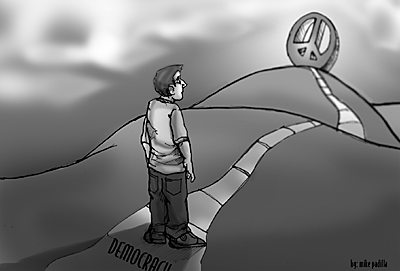
Illustration by Mike Padilla
|
|
By Johathan Riches
Arizona Daily Wildcat
Monday, February 7, 2005
Print this
"Democracies don't attack each other," President Clinton declared in his 1994 State of the Union address. Eleven years later, in his State of the Union, President Bush advanced the same hypothesis: Because democracies respect their own people and their neighbors, the advance of freedom will lead to peace." Both men summed up nicely the fundamental tenet of the "Democratic Peace Theory," namely, the idea that democracies do not go to war with one another.
The Democratic Peace Theory is perhaps the most widely accepted paradigm among international relations theorists. It has been described as "the closest thing we have to an empirical law in international relations." As stated, the theory of the Democratic Peace is relatively straightforward: Democracies do not engage one another in wars, and they are less likely to initiate war against other regimes. The fascinating thing about this "theory" is that historical evidence from the last several centuries suggests that the Democratic Peace is more of a truism than a hypothesis. The implication of the idea that democracies possess innate characteristics that prohibit conflict between them is both hopeful and promising. If true, it would seem that the quickest route to "world peace" is through the spread of democratic states. But first, let us look at the evidence.
There has never been a war between two democracies, where "democracy" is defined as a political system in which there is near universal suffrage and basic, secure political liberties. Take one moment to absorb that remarkable fact. No doubt, at this very moment, some of my readers are racking their brains to think of an exception to that statement. Well, continue to rack - you will not find one.
In 1997, University of Hawaii professor Rudy Rummel published an examination of all international conflicts for the period between 1816 and 1991. Although there had been more than 350 major international conflicts between nations during that time, not one of those pairings included opposing democracies. Further, professor Rummel's research explicitly supported the idea that democracies are far less likely to instigate war against other nations. In fact, since the inception of the United Nations in 1945, only the Suez War of 1956, in which Britain and France went to war with Egypt over the nationalization of the Suez canal, and arguably the Iraq War, stand out as instances in which a democracy initiated conflict with a non-democratic regime. However, the overwhelming weight of the evidence suggests that the Democratic Peace is not mere conjecture, but instead, plainly manifested behavior in the international community.
What, then, can explain this phenomenon? Democratic structures and normative theory both contribute to the Democratic Peace. First, democratic institutions, such as cabinets, legislatures, universal suffrage, civilian control over the military, free-enterprise market economies and an independent judiciary all contribute to the inherent pacifism of democratic states. Second, and more important, the Democratic Peace is attributed to the ideas and norms held by citizens of democratic nations. Essentially, democratic citizens wish to explore their own interests and promote their own well-being in an environment free from coercion. At the same time, government decision makers are rational thinkers who act in their own interests in order to remain in power. Since republican constitutions (at least in theory) require the consent of citizens before the state can go to war, democratic leaders are more hesitant to send their citizens into harm's way, lest the people disagree and vote them out of office during the next round of elections. Therefore, both citizens and government officials share an interest in peace and should want war only as a last resort.
This is, of course, the short version. But, at least to this writer, the evidence is more compelling than the theory. The Democratic Peace thus provides an effective mechanism, supported by history, for realizing what we all really want - an enduring peace.
If democracy continues to spread to areas of the world that are historically resilient to it, then all of this should be very good news. But of course, promoters of democracy have their challengers. As Steven Gieseler writes: "There will always be evil persons who wish to deny human beings the freedom they were granted by birthright. ... There will always be honest and well-meaning scholars, indifferent moral relativists, and self-interested tyrants who will for different reasons dismiss the idea that democracy is inherently just and peaceful." The worst of these individuals have an interest in repression. The best of them either ignore the numbers or look to history as happenchance. We should know better than both groups. In the meantime, those who truly wish to promote peace should begin by endorsing the spread of freedom.
Jonathan Riches is a first-year law student. He can be reached at letters@wildcat.arizona.edu.
